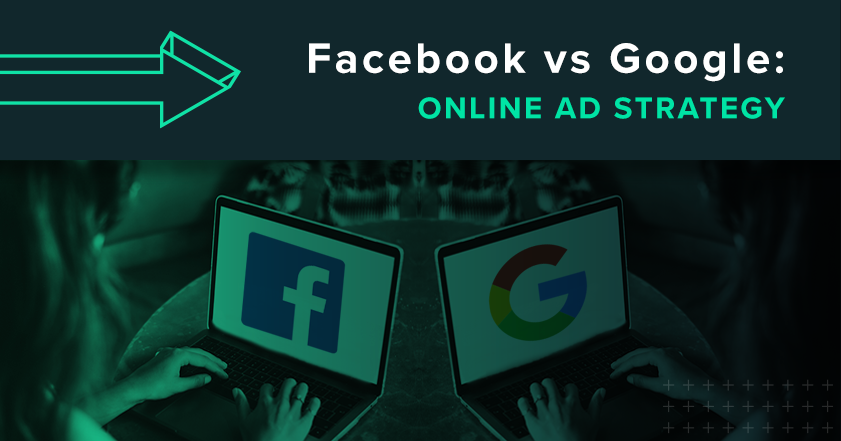Facebook vs Google: Online Ad Strategy

Your digital strategy should include some form of online advertising. There are 3.5 billion Google searches daily and Facebook has 1.45 billion users on the platform every day. Your target audience is online and looking for you, but getting in front of them might feel a little mystifying. To help take away some of the confusion, we have distinguished the advantages of advertising on Google and Facebook.
Audience Targeting
One huge advantage of online ads is ad targeting. You know how your Facebook feed seems to know that you need a new welcome mat and a guide to the best hiking trails in Costa Rica? That’s ad targeting.
Google and Facebook collect data points on every user based on their interests, search history, demographic data, and interaction with other posts and ads. You can create audiences based on this data. This can include their employer, job title, marital status, whether or not they have kids, household income level, and more. These data points are drawn on to create audiences and show your ads to users that match key points of your ideal client.
On Facebook, you can also create lookalike audiences. These audiences take similarities from a source audience and target ads to similar users while excluding users in your source audience. You can use lookalike audiences from multiple source audiences to create the audience for a single ad set, including visitors from your website and your Facebook page.
Retargeting is another way that online ad platforms allow marketers to target audiences that are likely to buy. Facebook allows you to do this using Facebook Pixel. You can install the Pixel on your website or landing page and then use the data to show your ads to people who already visited your website. Google has its own version of the Pixel you can use to retargeting web vistors, the Remarketing Tag.
Online ads are a key component of a well-rounded digital strategy. Both platforms allow you to meet people where they are in the buyer’s journey and provide them with access to your business’s offerings.
Ad Formatting
Ad formatting is largely going to depend on your platform, your objective, and the ad’s copy (its wording) and graphics (its images) that will best highlight your brand.
Facebook provides a great deal of flexibility to be creative with your text and visuals. There are limitations and guidelines, but you can use the combination of words and pictures that best demonstrate the value of your product or service.
With Google AdWords, or Search Ads, you’re limited just to text. So you need to be able to communicate an impactful message with short copy and no visuals. If you think your message is better served with visual imagery, then Google Display Ads may be a better choice. Google display ads are shown on various partner websites through the Google Display Network.
Choosing the right platform for your ads will depend largely on your business and on your digital marketing strategy. It may be wise to run test campaigns on Facebook and Google to determine which ad type works best for your business.
Choosing Your Objective
Facebook allows you to select from a wide number of objectives for your ads. You can run campaigns based on where your audience is in their buyer’s journey. From awareness to consideration to conversion, Facebook has several options for ads in each phase. Because Google generates results based on what users are looking for, Search Ads only target conversions and maximize clicks to your website, however Google Display Ads are great for generating exposure to your brand. Facebook and Google Display are more appropriate if you are looking to spread awareness of your product.
How Do I Know Which Platform is Right for My Business?
Once you’ve started considering the role ads play in your digital marketing strategy, you’ll get a clearer picture of what platform will work best for you. When you’ve determined your objective, target audience, and what you’re trying to achieve, reach out to us! Our team will recommend a strategy and budget that will help achieve your goals.






